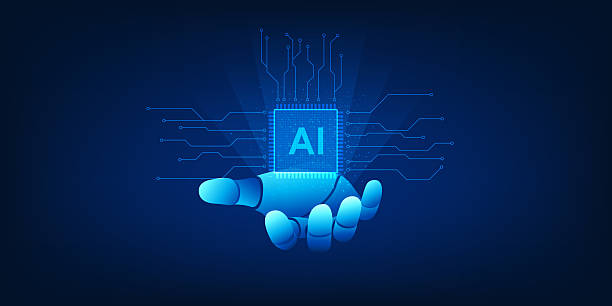What is Artificial Intelligence and How Does it Work?

Artificial Intelligence (AI) is a branch of computer science that deals with building machines that can perform tasks that usually require human intelligence. These tasks include learning, problem-solving, pattern recognition, language understanding, and decision-making. Artificial intelligence uses algorithms and complex mathematical models to analyze data and identify patterns and relationships based on them. These patterns and relationships are then used to predict, make decisions, and perform various tasks. In short, artificial intelligence tries to simulate human cognitive abilities in machines. This process involves collecting massive data, training machine learning models, and applying them in real-world situations.
There are different types of artificial intelligence, including: Machine Learning, which allows machines to learn from data without explicit programming; Natural Language Processing (NLP), which allows machines to understand and produce human language; and Computer Vision, which allows machines to see and interpret images. Each of these sub-branches has its own algorithms and techniques that are designed to solve specific problems. Artificial intelligence is a very dynamic and evolving field that is rapidly advancing and its applications in our daily lives are increasing.
Is your company’s website as professional and reliable as it should be? Create an online presence that represents your credibility and attracts more customers with specialized corporate website design by Rasaweb.
✅ Build a powerful and professional image of your brand
✅ Turn visitors into real customers
⚡ Get a free consultation right now!
History and Evolution of Artificial Intelligence

The history of Artificial Intelligence dates back to the 1950s, when scientists like Alan Turing and John McCarthy proposed initial ideas about building intelligent machines. In 1956, the Dartmouth Conference is known as a turning point in the history of artificial intelligence, because it was at this conference that the term “artificial intelligence” was officially introduced. In the early decades, many advances were made in problem-solving and game-playing (such as chess), but hardware and algorithmic limitations slowed progress.
In the 1980s and 1990s, with the development of new algorithms such as neural networks and the increase in the processing power of computers, Artificial Intelligence regained attention. But this period also faced challenges, including the problem of overfitting and the lack of training data. In the 2000s, with the emergence of Big Data and significant advances in hardware, artificial intelligence entered a new era. Deep Learning algorithms enabled machines to learn complex patterns and relationships from very large data sets, leading to major advances in areas such as computer vision, natural language processing, and speech recognition. Today, Artificial Intelligence is widely used in various industries such as medicine, finance, transportation, and manufacturing, and is predicted to play an even more important role in our lives in the future.
Applications of Artificial Intelligence in Everyday Life

Artificial Intelligence has many applications in our daily lives, although we may not always realize its presence. One of the most important applications is in voice assistants such as Siri and Google Assistant, which using natural language processing, can answer our questions, execute our commands, and find the information we need. In the field of medicine, Artificial Intelligence helps doctors diagnose diseases earlier and more accurately, provide personalized treatments, and accelerate the development of new drugs.
In the transportation industry, self-driving cars are a prime example of the application of Artificial Intelligence, which using sensors and computer vision algorithms, can move on roads without the need for a human driver. In the financial industry, Artificial Intelligence is used for fraud detection, risk management, and providing personalized financial advice. Also, in social networks and search engines, Artificial Intelligence algorithms are used to suggest relevant content, filter fake news, and improve the user experience. These are just a few examples of the widespread applications of artificial intelligence in our daily lives, and with further advances in this field, it is expected that new applications will emerge.
| Application Area | Example |
|---|---|
| Voice Assistants | Siri, Google Assistant |
| Medicine | Disease Diagnosis, Drug Development |
| Transportation | Self-Driving Cars |
| Finance | Fraud Detection |
| Social Networks | Content Recommendation |
Machine Learning and its Types

Machine Learning is one of the main sub-branches of Artificial Intelligence that allows machines to learn from data without explicit programming. In other words, machines identify patterns and relationships by analyzing data and make predictions and decisions based on them. Machine learning is divided into three main categories: Supervised Learning, Unsupervised Learning, and Reinforcement Learning.
In supervised learning, the machine is trained using Labeled Data, that is, data whose input and expected output are known. The goal is for the machine to learn a relationship between input and output and predict for new data. In unsupervised learning, the machine is trained using Unlabeled Data, that is, data whose expected output is not known. The goal is for the machine to identify patterns and hidden structures in the data. In reinforcement learning, the machine learns how to act in a specific environment to earn the most rewards by trial and error and receiving rewards or penalties. Each of these methods is suitable for specific problems and choosing the right method depends on the type of data and the goal we want to achieve.
Are you annoyed by losing customers who have visited your site to buy?
Rasaweb is your specialized solution for having a successful online store.
✅ Significantly increase your online sales
✅ Create trust and professional branding with customers⚡ Get free advice from Rasaweb experts!
Neural Networks and Deep Learning

Neural Networks are computational models inspired by the structure of the human brain. These networks are composed of a large number of small processing units called neurons that are interconnected in layers. Each neuron receives inputs from the neurons in the previous layer, processes them, and sends the output to the neurons in the next layer. By adjusting the weights between neurons, the neural network can learn complex patterns and relationships.
Deep Learning is a subset of machine learning that uses neural networks with a very large number of layers. These networks enable machines to learn very complex patterns and relationships from very large data sets. Deep learning has been particularly successful in areas such as computer vision, natural language processing, and speech recognition, leading to significant advances in these areas. For example, Convolutional Neural Networks (CNNs) are used in computer vision to detect objects in images and videos, and Recurrent Neural Networks (RNNs) are used in natural language processing to analyze text and machine translation.
Natural Language Processing and Machine Language Understanding

Natural Language Processing (NLP) is a branch of Artificial Intelligence that enables machines to understand, interpret, and produce human language. This includes analyzing the structure and meaning of sentences, recognizing language patterns, translating texts, and answering questions. Natural language processing uses various techniques such as language modeling, syntactic and semantic analysis, and machine learning to accurately process human language.
One of the most important applications of natural language processing is machine language understanding. This includes Named Entity Recognition (NER), Sentiment Analysis, and Text Summarization. Using these techniques, machines can extract important information from texts, detect the sentiments in texts, and provide a summary of long texts. Natural language processing is used in various fields such as chatbots, machine translation, information retrieval, and social media analysis, and with further advances in this field, it is expected to play a more important role in human-machine communication.
Computer Vision and Image Recognition

Computer Vision is a branch of Artificial Intelligence that enables machines to see, interpret, and extract information from images. This includes object detection, face recognition, motion detection, and scene analysis. Computer vision uses various techniques such as image processing, machine learning, and neural networks to accurately process images.
One of the most important applications of computer vision is image recognition. This includes detecting different objects in images, identifying faces, and recognizing different scenes. Using these techniques, machines can help humans in various fields such as self-driving cars, security systems, medical diagnosis, and robotics. For example, in self-driving cars, computer vision is used to detect traffic signs, pedestrians, and other cars. In security systems, computer vision is used to detect faces and identify suspicious people. In medical diagnosis, computer vision is used to diagnose diseases from medical images such as radiology and MRI. These are just a few examples of the widespread applications of computer vision in our daily lives, and with further advances in this field, it is expected that new applications will emerge.
| Application | Description |
|---|---|
| Self-Driving Cars | Detecting Traffic Signs and Pedestrians |
| Security Systems | Facial Recognition and Identifying People |
| Medical Diagnosis | Diagnosing Diseases from Medical Images |
Challenges and Limitations of Artificial Intelligence

Despite the significant advances in the field of Artificial Intelligence, there are still many challenges and limitations that need to be overcome. One of the most important challenges is the lack of training data. Training complex Artificial Intelligence models requires very large and diverse data, which can be very time-consuming and costly to collect and label. Another challenge is the problem of overfitting, that is, when the Artificial Intelligence model is too dependent on the training data and cannot generalize well to new data.
In addition, ethical issues are also among the important challenges of Artificial Intelligence. For example, the use of Artificial Intelligence in decision-making systems can lead to discrimination and inequality if the training data is biased. There are also concerns about job losses due to automation and the replacement of human labor with machines. To address these challenges, there is a need to develop new algorithms, collect diverse and unbiased data, and develop ethical rules and regulations for the use of Artificial Intelligence.
Do visitors to your online store leave before buying? Don’t worry anymore! With Rasaweb’s professional online store design services, solve the problem of not converting visitors into customers forever!
✅ Significant increase in conversion rate and sales
✅ Unique and attractive user experience
⚡ Contact us now for a free consultation!
The Future of Artificial Intelligence and its Impact on Society

The future of Artificial Intelligence looks very bright and it is expected that this technology will play a more important role in our lives in the future. With further advances in machine learning, computer vision, and natural language processing, Artificial Intelligence can help humans in various fields such as medicine, transportation, manufacturing, and services. For example, in medicine, Artificial Intelligence can help diagnose diseases, develop drugs, and provide personalized treatments.
In transportation, self-driving cars can increase the safety and efficiency of transportation and reduce traffic. In manufacturing, smart robots can automate manufacturing processes and increase product quality. In services, chatbots and virtual assistants can help customers solve problems and answer questions. However, the impact of Artificial Intelligence on society is not limited to its benefits. There are also concerns about job losses, increased inequality, and the misuse of Artificial Intelligence. To manage these challenges, there is a need for appropriate policies, education and workforce development, and the development of ethical rules and regulations to benefit from the advantages of Artificial Intelligence and prevent its risks.
How to Learn Artificial Intelligence?

Learning Artificial Intelligence can be an exciting and opportunity-filled journey. To get started, you can familiarize yourself with the basic concepts of Artificial Intelligence, machine learning, neural networks, and natural language processing. There are many online resources that you can use, including online training courses, books, articles, and videos. Some popular educational platforms include Coursera, edX, and Udacity, which offer various courses in the field of Artificial Intelligence.
In addition, you can strengthen your skills by participating in practical projects and working with Artificial Intelligence tools and libraries such as TensorFlow, PyTorch, and scikit-learn. You can also connect with experts in the field and benefit from their experiences by participating in Artificial Intelligence conferences and workshops. The most important thing is to continue learning with motivation and perseverance and not be afraid of challenges. Artificial Intelligence is a very dynamic and evolving field, so there is always something new to learn.
FAQ
| Question | Answer |
|---|---|
| What is the definition of Artificial Intelligence (AI)? | It is a field in computer science that aims to create intelligent machines that can think, learn, solve problems, and make decisions like humans. |
| Mention some common applications of artificial intelligence. | It includes self-driving cars, voice assistants (such as Siri and Alexa), recommendation systems (such as Netflix and Amazon), face recognition, and medical diagnosis. |
| What is the difference between Narrow Artificial Intelligence (ANI) and General Artificial Intelligence (AGI)? | Narrow artificial intelligence specializes in a single and specific task, while general artificial intelligence has human intellectual ability to perform any cognitive task. |
| What is Machine Learning and its relation to Artificial Intelligence? | Machine learning is a branch of artificial intelligence that focuses on developing algorithms that allow systems to learn from data without explicit programming. |
| What are Artificial Neural Networks? | They are computational models inspired by the structure and function of the human brain, and are used in deep learning to process data and discover complex patterns. |
| Mention some ethical challenges related to artificial intelligence. | It includes issues of privacy, bias in data and algorithms, job loss, and accountability in case of errors or unfair decisions. |
| What is Natural Language Processing (NLP)? | It is a branch of artificial intelligence that focuses on enabling computers to understand, interpret, and create human language in a useful and interactive way. |
| How can artificial intelligence affect the labor market? | It can lead to the automation of some routine tasks, requiring the retraining of workers and the creation of new jobs in the fields of design, development, and maintenance of artificial intelligence systems. |
| What is Computer Vision? | It is a field in artificial intelligence that enables computers to “see,” understand, and interpret images and videos in the same way that humans do, enabling them to recognize objects and faces. |
| What is the importance of data in the development of artificial intelligence systems? | Data is the fuel that feeds artificial intelligence systems, especially in machine learning. The quality and quantity of data greatly affect the accuracy and performance of the models and their ability to learn and make correct decisions. |
And other services of Rasa Web Advertising Agency in the field of advertising
Intelligent Brand Identity: A professional solution for managing campaigns with a focus on using real data.
Intelligent Content Strategy: A new service to increase user engagement through the use of real data.
Intelligent Advertising Campaign: A dedicated service to grow user engagement based on customizing the user experience.
Intelligent Brand Identity: Professional optimization to increase site visits using user experience customization.
Intelligent Custom Software: A dedicated service to grow sales based on managing Google Ads.
And more than hundreds of other services in the field of internet advertising, advertising consulting and organizational solutions
Internet Advertising | Advertising Strategy | Reportage Ad
Resources
What is artificial intelligence and how does it work?
,What is artificial intelligence and what are its applications?
,What is artificial intelligence and how does it work?
,How will the future of artificial intelligence change our lives?
? Is your business ready to leap towards the digital future? Rasaweb Digital Marketing Agency, by providing comprehensive services including modern user interface website design, SEO, and social media management, paves the way for your success. Contact us today and transform your brand’s future.
📍 Tehran, Mirdamad Street, next to the Central Bank, Kazerun South Alley, Ramin Alley No. 6




